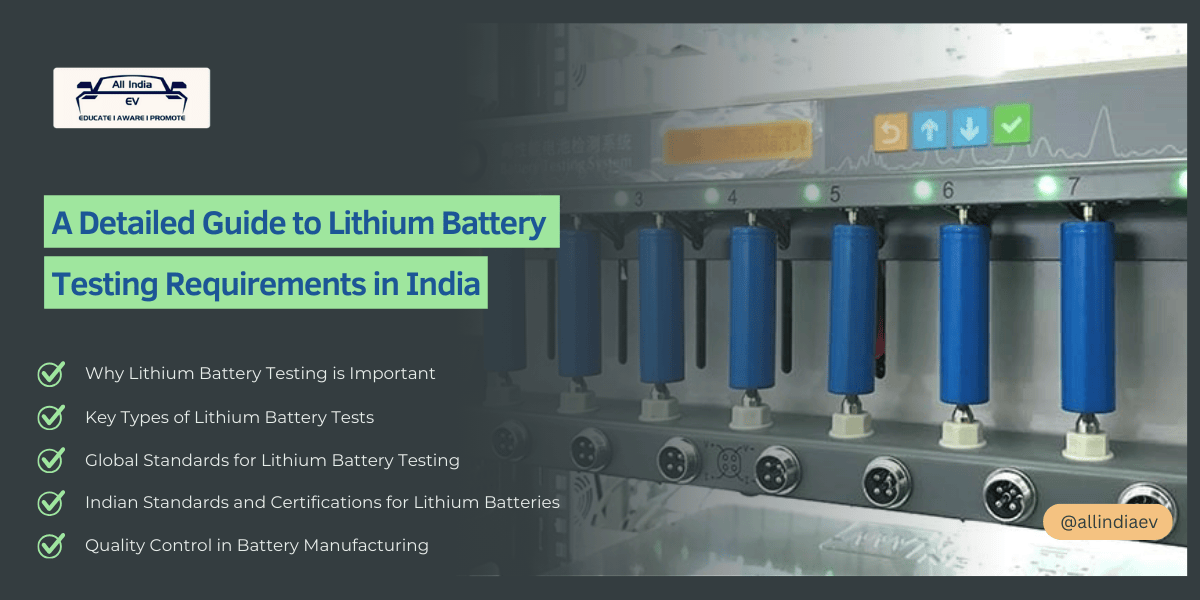
A Detailed Guide to Lithium Battery Testing Requirements in India
In recent years, India has experienced a rapid surge in demand for lithium-ion batteries. This growth is driven largely by the expanding electric vehicle (EV) market, increased use of renewable energy storage systems, and the popularity of portable electronics. However, to ensure these batteries remain safe, reliable, and efficient, they must undergo stringent testing. In this article, we’ll delve into the various testing requirements for lithium batteries in India, including vibration testing, and explore the global standards manufacturers must follow to meet both national and international guidelines.
Why Lithium Battery Testing is Important?
Lithium-ion batteries are favored for their high energy density and long life span. However, despite these advantages, they also carry potential risks. Factors like overheating, short circuits, or improper handling can cause fires or even explosions. This is why rigorous testing is critical to guarantee consumer safety. These tests evaluate battery performance, safety under stress, and environmental impact to ensure compliance with both local and global standards.
Key Types of Lithium Battery Tests
🔹 Capacity Testing
Capacity testing measures how much charge a battery can store and how much power it can deliver over time. This is a crucial test to determine how long a battery will last during use. The two main methods used for this test are:
▸ Constant Voltage Charging: The battery is charged at a steady voltage.
▸ Constant Current Discharging: The battery is discharged at a constant current to measure its output.
These methods help ensure the battery meets the required performance specifications and is suitable for its intended application.
🔹 Internal Resistance Testing
Internal resistance affects a battery’s ability to convert stored energy into power efficiently. High internal resistance can reduce the overall performance of the battery. Testing this parameter helps identify potential energy loss within the battery and evaluates its capacity to deliver the necessary power output.
🔹 Cycle Life Testing
Cycle life testing simulates real-world charging and discharging conditions to determine how many charge-discharge cycles a battery can undergo before it starts to degrade. This test is especially critical for applications like electric vehicles and energy storage systems, where long-term reliability is crucial.
🔹 Temperature Testing
Lithium-ion batteries are sensitive to temperature variations, which can significantly impact their performance and safety. Temperature testing ensures batteries can operate safely under different thermal conditions, such as extreme heat or cold. This test helps prevent overheating, performance loss, or even dangerous incidents like battery fires.
🔹 Vibration Testing
Vibration testing is particularly important for batteries used in environments where they are exposed to mechanical stress, such as in electric vehicles or portable electronics. It evaluates the battery’s structural integrity and ensures that components can withstand vibrations during operation or transportation without suffering internal damage.
Key Objectives of Vibration Testing:
Safety Assurance: Identifies potential hazards, such as leakage, fire, or short circuits, that may arise from vibrations.
Vibration tests for lithium batteries in India follow international standards such as IEC 62133 and UN 38.3.
Mechanical Integrity: Ensures the internal components stay intact under mechanical stress.
Connection Stability: Verifies that electrical connections remain secure even when exposed to vibrations.
🔹 Safety Testing
Safety testing is one of the most important aspects of lithium battery evaluation. This process examines how the battery reacts to overcharging, short circuits, and extreme temperatures. These tests help ensure that even under adverse conditions, the battery will not pose a danger to users or devices.
Global Standards for Lithium Battery Testing
To ensure safe usage and transportation, lithium-ion batteries must meet strict national and international standards. Here are some of the key global standards manufacturers need to follow:
▸ IEC 62133: A key standard for rechargeable lithium-ion batteries, specifying safety requirements for portable applications.
▸ UN 38.3: Defines testing for lithium batteries during transportation, ensuring they can withstand mechanical stress, temperature changes, and low-pressure conditions.
▸ UL 2580: Specifically for the safety of batteries used in electric vehicles.
These standards provide a comprehensive framework to harmonize safety protocols worldwide, ensuring that lithium-ion batteries are tested for optimal performance and safety.
Indian Standards and Certifications for Lithium Batteries
In India, the Bureau of Indian Standards (BIS) is responsible for regulating and certifying lithium batteries.
BIS standards align with both national and international testing requirements, and manufacturers must comply with the following key standards:
▸ IS 16046 (Part 1 and Part 2): Based on the IEC 62133 standard and outlines the safety requirements for lithium cells used in portable devices.
▸ AIS 156: Specifies safety and performance requirements for electric vehicle batteries, including mechanical and electrical testing.
▸ IS 17092: Focuses on lithium-ion batteries used in stationary applications, such as renewable energy storage systems.
The Indian government mandates BIS certification for specific lithium battery products, ensuring that only products meeting these standards are available to consumers.
Quality Control in Battery Manufacturing
Quality control is vital throughout the battery manufacturing process to guarantee performance and safety. Here are the critical aspects of quality control:
Battery Performance Testing: Ensures the battery performs according to its specifications in various environmental conditions.
Environmental Testing: Evaluates how external factors like temperature, humidity, and altitude impact battery performance.
Abuse Testing: Simulates extreme conditions, such as physical shock, crushing, or puncturing, to ensure the battery can withstand potential misuse without failing.
In India, where the demand for lithium-ion batteries is rapidly increasing, ensuring the safety and reliability of these batteries is of utmost importance. Whether for electric vehicles, consumer electronics, or renewable energy storage, following both international and Indian testing standards is critical. Rigorous testing, including vibration testing, ensures that lithium batteries meet the highest quality standards. By adhering to these protocols, manufacturers can guarantee the safety and performance of their products, thus fostering consumer trust and supporting the continued growth of this technology.









